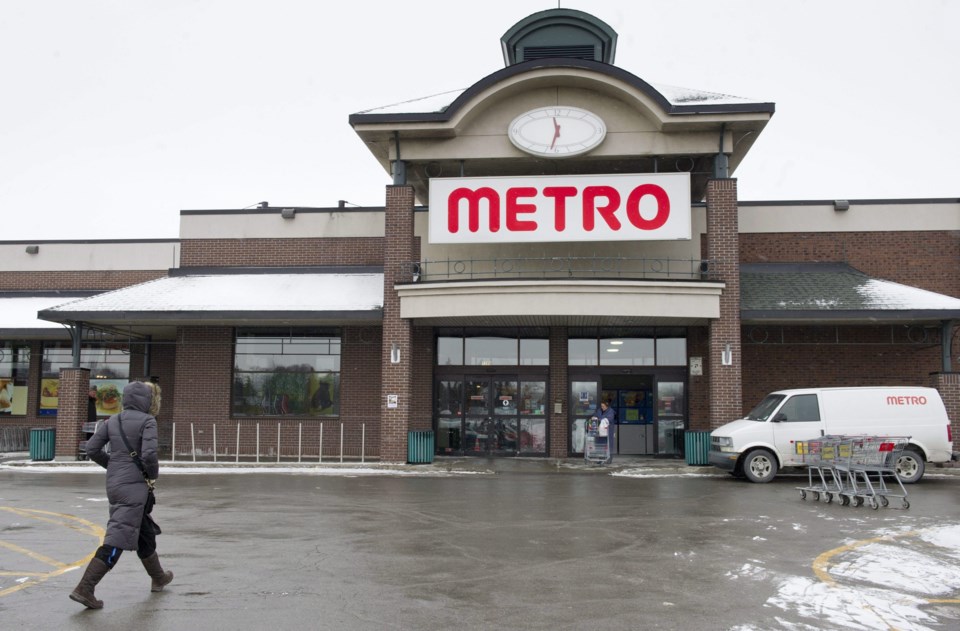Metro Inc., the first of sa���ʴ�ý's big three grocers to release earnings this year, reported Tuesday a double-digit increase in profits and a 10 per cent dividend hike following a period that saw food prices rise at the fastest pace in decades.
Grocers have come under intense scrutiny in recent months for posting strong profits as many Canadians struggle with higher food costs.
Metro said higher costs are being passed through the supply chain from food manufacturers, wholesalers, processors and producers.
"In 2022, Metro received more than 27,000 price increases averaging more than 10 per cent from suppliers for dry groceries alone — nearly three times the annual average," Metro CEO Eric La Flèche said during an annual meeting of shareholders on Tuesday.
"This high inflation over the past several months is difficult for everyone to accept, but it is a global reality (and) sa���ʴ�ý is faring better than most countries."
Critics have accused grocers of so-called greedflation, suggesting they are profiteering at a time of spiralling inflation, but companies have repeatedly said their profit margins on food remain stable.
In fact, La Flèche said Metro is "absorbing some of the (price) increases as our gross food margins are decreasing."
Yet researchers have said a lack of transparency in the financial results of grocers makes it difficult to determine profit margins on food because companies lump different retail segments — such as food, pharmacy and general merchandise — together. Items such as cosmetics, over-the-counter drugs and apparel are thought to have higher gross profit margins.
Metro, which operates both supermarkets and drugstores, reported net income of $231.1 million in its first quarter, up 11.3 per cent from $207.7 million in the same quarter a year ago.
The profit amounted to 97 cents per diluted share for the 12-weeks ended Dec. 17, up from 85 cents per diluted share a year earlier, prompting the company to raise its quarterly dividend to 30.25 cents per share, up from 27.5 cents per share.
On an adjusted basis, Metro said it earned $1.00 per diluted share, up from an adjusted profit of 88 cents per diluted share a year earlier.
Metro's sales in the quarter totalled $4.67 billion, up 8.2 per cent from nearly $4.32 billion a year ago.
But La Flèche said the increase was "mainly due to higher inflation this quarter."
Food same-store sales rose 7.5 per cent compared with a year ago.
Metro's internal food basket inflation was 10 per cent, more than one percentage point below overall grocery inflation as measured by Statistics sa���ʴ�ý's consumer price index for the period.
RBC Dominion Securities analyst Irene Nattel said in a client note that the gap reflects "real-time consumer value-seeking/trade down activity."
In other words, shoppers are bargain hunting and buying food on sale in order to save money on groceries.
Meanwhile, news reports have suggested grocery store theft is on the rise across sa���ʴ�ý as the cost of food soars.
"Any time there's high inflation or rapid inflation like we've seen, you do see some increases in theft," La Flèche said, noting that the uptick varies between different stores and markets.
Metro's grocery network of about 975 stores includes full-service supermarkets like Metro Plus and Adonis, discount stores like Super C in Quebec and Food Basics in Ontario, and neighbourhood and specialty stores like Marché Richelieu, Marché Ami and Première Moisson.
Pharmacy same-store sales gained 7.7 per cent compared with a year ago. That included a 6.5 per cent increase in prescription drug sales and a 10.2 per cent increase in front-store sales primarily driven by over-the-counter products, cosmetics and health and beauty, La Flèche said.
The company has about 645 drugstores under banners including Brunet, Clini Plus, Jean Coutu and pharmacies within Metro and Food Basics stores.
Meanwhile, Metro's top executives received a hearty pay bump in 2022, with the company's top five executives sharing $13.2 million in compensation for fiscal 2022 — about four per cent higher than the year before, according to regulatory documents.
Their annual bonus increases, tied to company performance, were even more generous: the execs shared $3.7 million in annual bonuses, a 13.7 per cent increase over last year. La Flèche's bonus jumped 15 per cent, to $1.5 million.
In a notice sent to shareholders, Metro said the company's board of directors established "high sales targets" to determine bonus amounts.
Those bonuses faced scrutiny during the company's annual meeting with shareholders.
La Flèche's told reporters during a media briefing that "everybody's entitled to their opinion."
"I don't think our bonuses at Metro are anything to be concerned about," he said. "We're a large company we have to have competitive compensation for managers. We compare very favourably reasonably to our comparator group. I don't think there's anything problematic about our bonuses in 2022 or any prior years."
This report by The Canadian Press was first published Jan. 24, 2023.
Companies in this story: (TSX:MRU)
Brett Bundale, The Canadian Press


